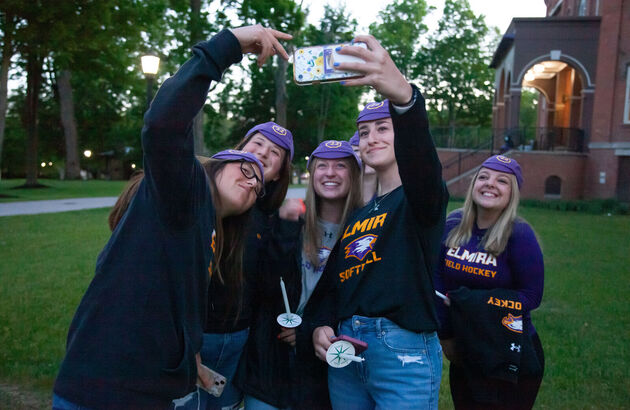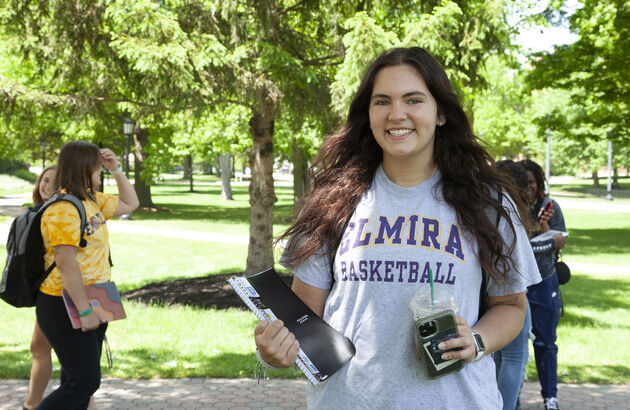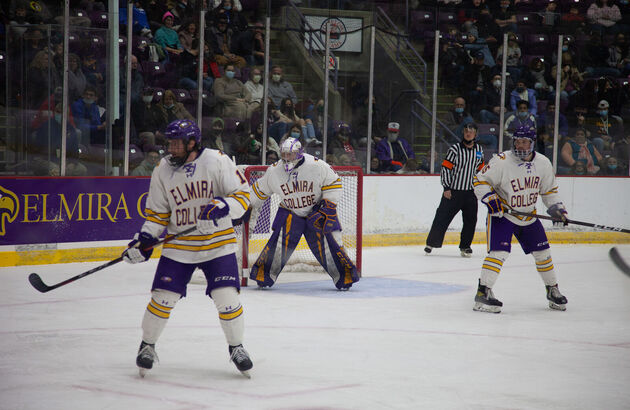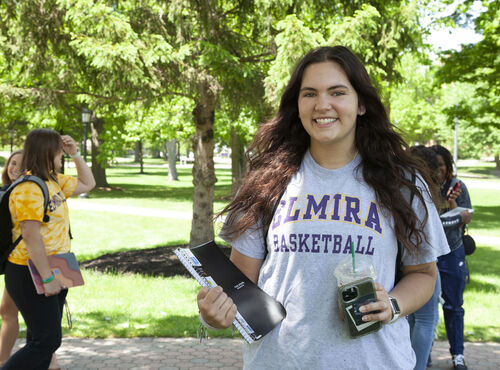Campus Map
The EC campus map can help you find your way around campus and find the best parking spot.
Welcome
About EC
Getting Started
Academic Resources
Apply to EC
Visit Campus
Tuition & Financial Aid
Campus Life
Outcomes & Careers
Athletics
Alumni

Grounded in the liberal arts and sciences, Elmira College provides a collaborative and supportive environment that enables students to become active learners, effective leaders, responsible community members, and globally engaged citizens.

The legacy of academic excellence at Elmira College runs deep with a heritage and culture that have been forward-thinking from day one, as the first college for women with a course study equivalent to men's.

At Elmira, you’ll have opportunities that shape your future, raise your sights and equip you with targeted tools and skills to succeed in the professional world. Join a community that’s close-knit, fun-loving, and just the right amount of quirky.

Elmira College makes a private education more affordable than you realize, with a number of ways to get the financial assistance you may need. Our financial aid office can guide you through options, including scholarships, grants, loans, and work-study programs.

Elmira College includes meeting students from around the world, participating in Elmira traditions, completing community service projects, and hopping into a pickup kickball game.

Elmira College provides you with a foundation for future success.

The home of the three-time NCAA National Champion Elmira College Soaring Eagles.

Elmira College alumni stay connected and engaged with the College long after they graduate.

Gifts to Elmira College ensure excellent academic and co-curricular opportunities for generations of EC students.

The EC campus map can help you find your way around campus and find the best parking spot.

With over 35 majors and minor areas of concentration, Elmira College lays the foundation for a diverse, cross discipline education, encouraging you to both specialize and explore.

Internal dashboard for EC news, events, resources, and more. Log-in required.

Looking for registration deadlines, spring break or when grades are due? Our academic calendar has all of the important events for this academic year.

Check out our news section to learn about all that's going on at Elmira College.

Looking for a small, close-knit campus filled with incredible, hands-on learning opportunities? Our Admissions Office can help make Elmira College YOUR place.
Info For








Incoming first-year EC students take a First Year Seminar course to learn skills to help them succeed academically and socially.

In your first year, you'll take a course called First Year Seminar. It is focused on teaching you "how to college" and helps you explore learning beyond your major. This class is all about sharpening your critical thinking and reading skills—things that’ll help you throughout college and beyond. The best part? You get to pick from a bunch of interesting topics, from science and history to art and society. Each professor brings their own expertise and passion, making every seminar a unique experience!

(Honors Section) Animating the World of Myth
Voices of the past speak to us through myths and folklore. These ancient stories, passed down through generations, describe worldviews and offer wisdom for people from every part of the world. This class will explore and compare the traditional stories of cultures from around the world as they are retold by modern storytellers and artists, with an emphasis on foreign-films, animations, paintings, sculptures, and other modes of artistic interpretation. You will respond through analytical writing and creative projects.
(Honors Section) Mind Hacks: Tools for Making Sense of the World
Was the moon landing a hoax? Have aliens visited the earth? Did the government secretly plan to kill its own citizens? Is the devil operating a new world order? In this course, we will explore these kinds of questions and develop the skills needed to make sense of arguments. The tools of scepticism, evidence, analysis, and logic will become our mind hacks. They will help us avoid being duped by mass hysteria, logical fallacies, unsupported assumptions, and coercive persuasion. Throughout the course, we will discuss real-world hoaxes and mass paranoia movements throughout history, and we will apply our mind hacks to investigate modern day examples.
Art, Design, and the Environment
Never before have environmental issues been more pressing and creative solutions needed. In this course, you will develop a broad understanding of these environmental issues and their relationship to the social, political, cultural, and economic systems that impact the future of humanity, other species, and our shared planet. You will understand how your own work as an individual, artist, or designer can comment on, interact with, and impact the world. This course will explore artistic responses to environmental sustainability and related social issues. You will develop collaborative and creative individual projects that may take the form of social/relational art practice, video, installation, performance, writing, sound, 2D or 3D form, and electronic media. The course will focus on artists, designers, and architects that work across disciplines and within communities to focus attention on the web of interrelationships in our environment, from the physical and biological to the cultural, political, and historical.
CSI: EC
In this section of FYS, we’ll explore the topic of crime scene investigation (CSI) by studying both the history of and the modern scientific advancements in this field. We’ll read classic texts such as some from the Sherlock Holmes book series, we’ll watch episodes of popular TV shows that incorporate forensics, we’ll learn some common investigative procedures such as fingerprinting, and we’ll study how scientific evidence was collected and used in a number of famous cases.
Dungeons and Dorms
This how-to college course sets you up for academic success through exploring what we can learn from collaborative storytelling games, from role playing classics like Dungeons and Dragons and goth-favorite Vampire: The Masquerade, to the pre-internet Infocom text adventures of the 80s (think Zork and Hitchhikers Guide to the Galaxy), and even solo RPGs like Choose Your Own Adventure stories. You will explore such questions as:
- How do these games shape relationships between players as they create and inhabit diverse identities, solve dilemmas, and build imaginary worlds?
- In what ways do these stories and characters reflect, transmit, reinforce, or resist cultural biases and norms?
- How might we redesign games to create new possibilities for players – and in so doing, expand our own?
Alongside learning about and gaining practical skills in navigating the challenges of college life, we will work in teams to invent, design, and showcase, by the end of the term, our own original tabletop and indie role-playing games.
Imaginary Cities
What are cities, exactly, and why do they exist? How are cities shaped by human norms, values, beliefs, and biases? And, how do cities in turn shape the way we experience the world, the relationships we form, and the lives we are able to live? In other words, while we create cities, cities also create us. You will begin by learning about the historical and psychological dimensions of urban design. Together, we will set forth to explore Elmira and interpret what we find through perception maps, creative writing, and photo essays. You will then dive into films and short stories about utopian and dystopian cities, and study efforts by intentional communities ecovillages, communes, and coops to create better micro societies. Finally, in teams, you will design own perfect city and present it as a diorama in the medium of your choice: Play-Doh? Legos? Cardboard? Something else? You will also create a compelling advertisement to sell your city to prospective residents.
Lights, Camera, Re-Action!
Do you love viewing films and talking about them with friends? Are you searching for a deeper understanding of the moving image, beyond the popular 10 second TikTok video? If so, this is the class for you! You will view feature films, short films, and television episodes. You will read related critical essays to help analyze and write about the artistic and technical choices made by filmmakers. In addition, you will collaborate to create video podcasts in response to class readings and research, using your own smart phone technology. The focus is to develop an appreciation of film as a powerful art form that can inform and inspire change.
Secret Codes, Hidden Figures, and Modern Movies
Come experience the fun of creating your own secret codes and secret societies while attempting to decode the secret messages of your friends! In this course, you will learn about how human history has been shaped by the making and breaking of codes, as well as other related advances in STEM (science, technology, engineering, and mathematics). Throughout the term, you will watch and discuss modern movies that highlight the people behind groundbreaking discoveries in STEM, both historical and fictional. Watching these movies will lead to important discussions about:
– Whose stories get told through popular film?
– Whose achievements have we traditionally celebrated?
– Who are the hidden figures that we are now beginning to celebrate?
– Why does representation matter?
S.O.A.R. (Student Orientation, Achievement, and Responsibility)
This course is designed to optimize the transition of new students to Elmira College. Focusing on key components of campus life, the instructors utilize engaging activities and insights to highlight the perspectives, skills, and activities that you need to succeed at Elmira College. By focusing on the purpose and benefits that college life provides, you will take part in a discovery process to enhance your experience at Elmira College.
The Music of Your Life
Come join us as we adventure through the world of music! In this course, we’ll explore the who, what, where, when, and why of music in everyday life. We'll discuss your favorite songs and artists, survey the most popular forms of music in America right now, and explore the music used in movies and video games. Even more fun, you’ll learn how to create your own music and make the soundtrack of your life!
True Crime and Me
This section of FYS considers the social and cultural implications of representations of crime in popular media, including journalism, docu-series, and podcasts. We will draw on methods and frameworks from media and cultural studies to explore questions about the values and ethics implied by, or circulated in, crime media, examine the ways we engage with different kinds of media, and situate ourselves more critically in relation to popular representations of crime.
Understanding the Mind of a Criminal
Curious why people behave the way they do? Ever wonder what leads to criminal behavior? In this course, we'll explore the concepts of deviance and criminal behavior in our society. We'll discuss how the idea of deviance is influenced by society, culture, and geographical location. We'll also explore the behaviors associated with crime. Throughout the course, we'll investigate high profile cases from modern TV shows, podcasts, movies, and/or books. By the end of the course, we'll see that not all deviance is crime. But is all crime deviant?
Wayfinder’s Voyage – Discover Your Path
Transitioning to college can prompt many questions – What major is best for me? How will I know that I fit in? What do I do with all this extra time between classes? This course gets its name from “wayfinding,” the ancient art of figuring out where you are going when you don’t actually know your destination. Through a blend of discussions, activities, guest speakers and reflection, students will discover their inner compass and develop effective tools that will lead them on a path that helps them navigate college and plan for a successful future. This course will cover topics such as: tips for a successful transition to college; academic tools and success strategies; choosing a meaningful major; setting academic, personal and professional goals; and exploring career options. Through this course, students will develop the confidence they need to embark on their college journey and embrace all that the experience has to offer.
A Walk in Nature with a Biologist (newly added)
What can a forest teach you about college—and about life? In this course, we’ll trade the classroom for the trails as we explore the forest through the eyes of a biologist. Along the way, you’ll sharpen your critical thinking, observation, discussion, and reflective writing skills, all while learning how to approach complex questions about the natural world. This course isn’t just about trees and wildlife (though you’ll definitely meet some of each!). It’s about learning how to ask good questions, make thoughtful connections, and engage deeply with your surroundings—skills that apply in any major and any field. As we walk and talk through local woodlands, you’ll also get to know your classmates, your professor, and yourself a little better.

